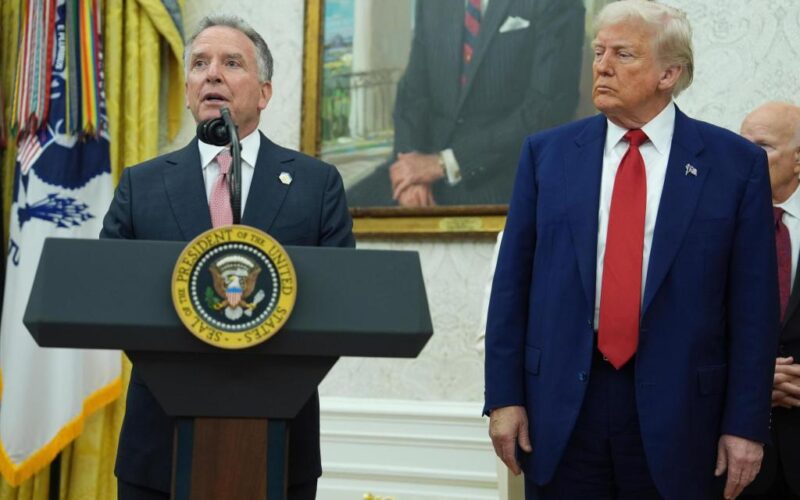By SAMY MAGDY and JOSEPH KRAUSS, Associated Press
Israel has accepted a new U.S. proposal for a temporary ceasefire with Hamas, the White House said Thursday.
“I can confirm that special envoy (Steve) Witkoff and the president submitted a ceasefire proposal to Hamas that Israel backed and supported,” White House press Karoline Leavitt told reporters.
But Leavitt said talks were ongoing and Hamas had not yet accepted terms of the proposal.
Witkoff on Wednesday said the U.S. administration was close to presenting a new proposal.
The new proposal was intended to return surviving as well as dead hostages still being held in Gaza in exchange for an an extended truce in fighting.
THIS IS A BREAKING NEWS UPDATE. AP’s earlier story follows below.
U.S. President Donald Trump’s Mideast envoy expressed optimism this week about brokering an agreement to halt the Israel-Hamas war and return more of the hostages captured in the attack that ignited it.
“I have some very good feelings about getting to a long-term resolution — a temporary ceasefire and a long-term resolution, a peaceful resolution of that conflict,” Steve Witkoff said in Washington on Wednesday, adding that a new U.S. proposal would soon be delivered to the warring parties.
Hamas, meanwhile, said it had agreed with Witkoff on a “general framework” of an agreement that would lead to a lasting ceasefire, a full Israeli withdrawal from Gaza, an influx of aid, and a transfer of power from the organization to a politically independent committee of Palestinians.
Hamas has been designated as a terrorist organization by the United States, Canada and the European Union.
Israel, however, has publicly ruled out any such agreement, saying it would only agree to temporary pauses in the fighting to facilitate the release of hostages. Israeli media have quoted officials as denying that any agreement along the lines described by Hamas is on the table.
What do Israel and Hamas want?
Israeli Prime Minister Benjamin Netanyahu has refused to end the war until all the hostages are released and Hamas is either destroyed or disarmed and sent into exile. He has said Israel will control Gaza indefinitely and facilitate what he refers to as the voluntary emigration of much of its population.
Palestinians and most of the international community have rejected plans to resettle Gaza’s population, a move experts say would likely violate international law.
Hamas has said it will only release the remaining hostages — its only bargaining chip — in return for more Palestinian prisoners, a lasting ceasefire and a full Israeli withdrawal. It has offered to give up power to a committee of politically independent Palestinians that could oversee reconstruction.
Hamas is still holding 58 hostages. Around a third are believed to be alive, though many fear they are in grave danger the longer the war goes on. Thousands of Palestinians have been killed since Israel renewed its airstrikes and ground operations after ending a ceasefire in March.
The dispute over whether there should be a temporary ceasefire to release more hostages — as Israel has called for — or a permanent one — as Hamas wants — has bedeviled talks brokered by the U.S., Egypt and Qatar for more than a year and a half, and there’s no indication it has been resolved.
What is the latest ceasefire proposal?
Witkoff has not publicized his latest proposal, but a Hamas official and an Egyptian official independently confirmed some of the details. They spoke on condition of anonymity to discuss the sensitive talks.
They say it calls for a 60-day pause in fighting, guarantees of serious negotiations leading to a long-term truce and assurances that Israel will not resume hostilities after the release of hostages, as it did in March. Israeli forces would pull back to the positions they held during the ceasefire Israel ended that month.
Hamas would release 10 living hostages and a number of bodies during the 60-day pause in exchange for more than 1,100 Palestinians imprisoned by Israel, including 100 serving long sentences after being convicted of deadly attacks.
Each day, hundreds of trucks carrying food and humanitarian aid would be allowed to enter Gaza, where experts say a nearly three-month Israeli blockade — slightly eased in recent days — has pushed the population to the brink of famine.

Why is it so hard to end the war?
Hamas-led terrorists stormed southern Israel on Oct. 7, 2023, killing some 1,200 people, mostly civilians, and abducting 251 hostages. More than half the hostages have been released in ceasefires or other deals. Israel has rescued eight and recovered dozens of bodies.
Israel’s ensuing military campaign has killed over 54,000 Palestinians, mostly women and children, according to the Gaza Health Ministry, which does not say how many of the dead were civilians or combatants.
The offensive has destroyed vast areas of Gaza and displaced around 90% of its population of roughly 2 million Palestinians, with hundreds of thousands living in squalid tent camps and unused schools.
Hamas has been vastly depleted militarily and lost nearly all of its top leaders in Gaza. It likely fears that releasing all the hostages without securing a permanent ceasefire would allow Israel to launch an even more devastating campaign to ultimately destroy the group.
Israel fears that a lasting ceasefire and withdrawal now would leave Hamas with significant influence in Gaza, even if it surrenders formal power. With time, Hamas might be able to rebuild its military might and eventually launch more Oct. 7-style attacks.
A broader resolution to the decades-old Israeli-Palestinian conflict appears more distant than ever.
The Palestinians are weak and divided, and Israel’s current government — the most nationalist and religious in its history — is opposed to Palestinian demands for a state in Gaza, the West Bank and east Jerusalem, territories Israel occupied in the 1967 Mideast war.
The last serious peace talks broke down more than 15 years ago.
Magdy reported from Cairo.








